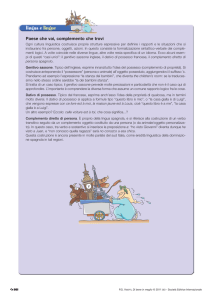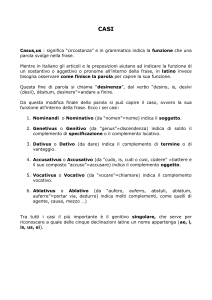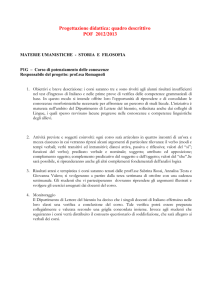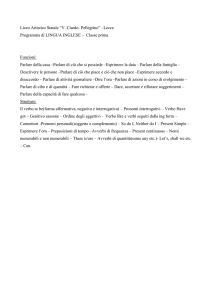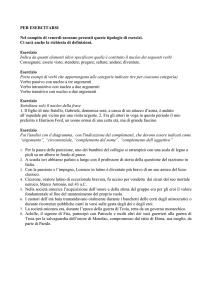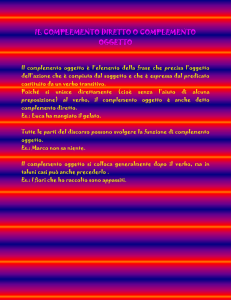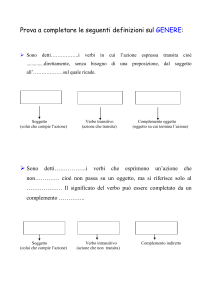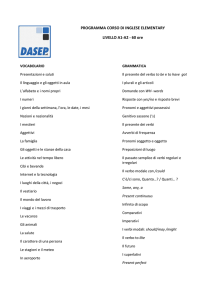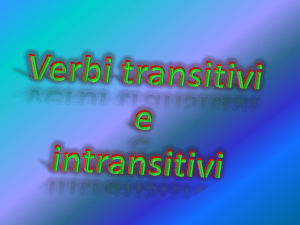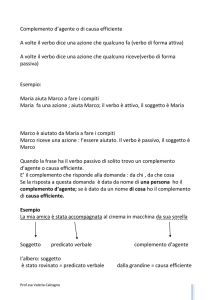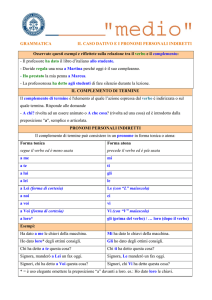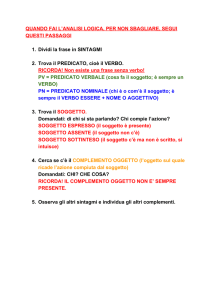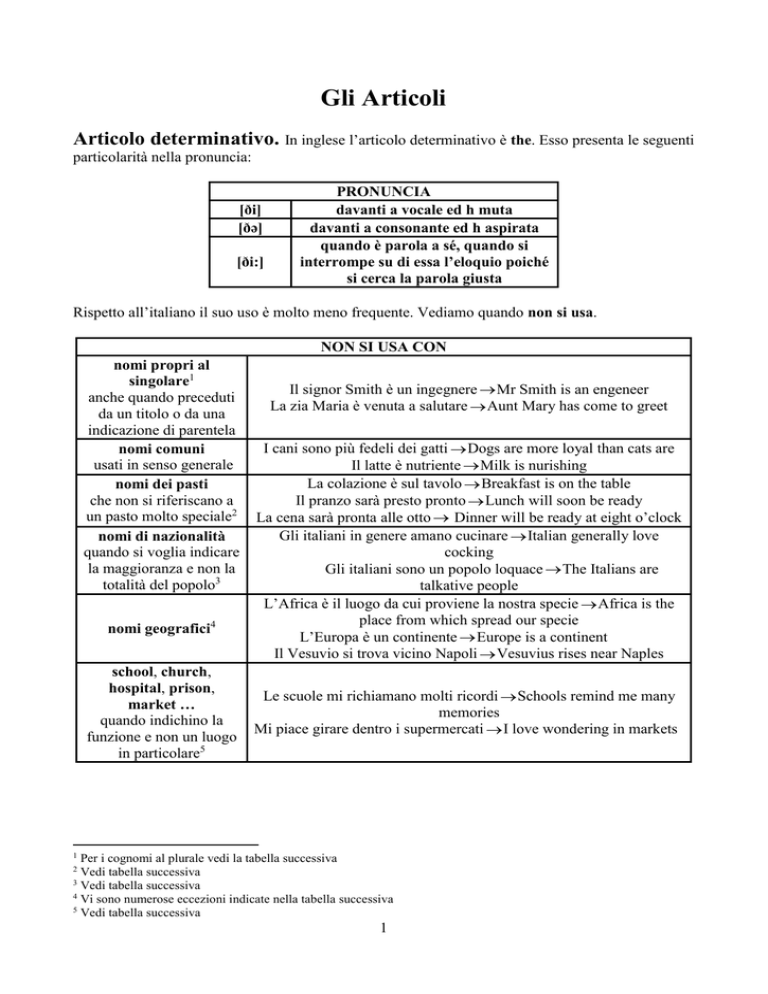
Gli Articoli
Articolo determinativo. In inglese l’articolo determinativo è the. Esso presenta le seguenti
particolarità nella pronuncia:
[ði]
[ðə]
[ði:]
PRONUNCIA
davanti a vocale ed h muta
davanti a consonante ed h aspirata
quando è parola a sé, quando si
interrompe su di essa l’eloquio poiché
si cerca la parola giusta
Rispetto all’italiano il suo uso è molto meno frequente. Vediamo quando non si usa.
NON SI USA CON
nomi propri al
singolare1
anche quando preceduti
da un titolo o da una
indicazione di parentela
nomi comuni
usati in senso generale
nomi dei pasti
che non si riferiscano a
un pasto molto speciale2
nomi di nazionalità
quando si voglia indicare
la maggioranza e non la
totalità del popolo3
nomi geografici4
school, church,
hospital, prison,
market …
quando indichino la
funzione e non un luogo
in particolare5
Il signor Smith è un ingegnere Mr Smith is an engeneer
La zia Maria è venuta a salutare Aunt Mary has come to greet
I cani sono più fedeli dei gatti Dogs are more loyal than cats are
Il latte è nutriente Milk is nurishing
La colazione è sul tavolo Breakfast is on the table
Il pranzo sarà presto pronto Lunch will soon be ready
La cena sarà pronta alle otto Dinner will be ready at eight o’clock
Gli italiani in genere amano cucinare Italian generally love
cocking
Gli italiani sono un popolo loquace The Italians are
talkative people
L’Africa è il luogo da cui proviene la nostra specie Africa is the
place from which spread our specie
L’Europa è un continente Europe is a continent
Il Vesuvio si trova vicino Napoli Vesuvius rises near Naples
Le scuole mi richiamano molti ricordi Schools remind me many
memories
Mi piace girare dentro i supermercati I love wondering in markets
1
Per i cognomi al plurale vedi la tabella successiva
Vedi tabella successiva
3
Vedi tabella successiva
4
Vi sono numerose eccezioni indicate nella tabella successiva
5
Vedi tabella successiva
2
1
father, mother, daddy,
mummy, teacher,
nurse…
quando si intenda mio
padre, mia madre …
nomi di giorni, mesi e
stagioni
usati in senso generale
aggettivi possessivi
next
quando si fa riferimento
a un tempo
immediatamente futuro
last
quando si fa riferimento
a un tempo
immediatamente passato
L’insegnate ci ha illustrato la struttura delle proteine
Teacher showed us the structure of proteins
Il papà questa sera non rincasa Father will not come back home
this evening
Il sabato è il mio giorno preferito Saturday is my favorite day
Luglio è il mese più caldo July is the hottest month ever
L’autunno è la stagione in cui gli alberi sparpagliano le loro foglie
Autumn is season when trees shed their leaves
La mia auto è molto vecchia My car is very old
John sta guidando la sua nuova auto John is driving his new car
Il prossimo giugno compio 32 anni Next July I will be 32
Il prossimo lunedì sarà il mio primo giorno di lavoro
Next monday will be my first day of work
Il mese scorso ho acquistato la nuova casa Last month I bought
my new house
Ho finito quel romanzo la settimana scorsa I finished that novel
last week
Vediamo ora quando si usa.
SI USA CON
nomi propri al plurale
ovvero
cognomi
nomi comuni
usati in senso specifico
nomi di pasti
particolari
nomi di nazionalità
quando si voglia indicare
la totalità del popolo
nomi geografici
che siano nomi di paesi
che risultano dall’unione
di più entità
nomi geografici
di mari, oceani, fiumi e
catene montuose (non
singoli monti)
nomi geografici
di capi e laghi che
contengano of6
Gli Smith sono miei vicini The Smiths are my neighbours
La macchina che ho appena comprato ieri è una Toyota The car
I’ve just bought is a Toyota
Will you come to the dinner we have organized for celebrating
John’s promotion?
Gli italiani sono un popolo loquace The Italians are a talkative
people
I Paesi Bassi The Low Countries
Gli Stati Uniti The United States
Il Regno Unito The United Kingdom
Il Mediterraneo The Mediterranean
L’Oceano Atlantico The Atlantic Ocean
Il Tamigi The Thames
Le Alpi The Alpes
Il Capo di Buona Speranza The Cape of Good Hope
Il lago di Como The Lake of Como
Se invece non c’è la particella of allora non si ha l’articolo determinativo (Il lago Ontario Lake Ontario, Il Capo
Horn Cape Horn)
6
2
nomi geografici
di alcuni luoghi
particolari
La Crimea The Crimea
Il Tirolo The Tyrol
Il Sudan The Sudan
Il Sahara The Sahara
school, church,
hospital, prison,
market …
quando indichino un
edificio in particolare
Il giorno del matrimonio di John la chiesa era molto affollata
The church was very crowded the day of John’s wedding
punti cardinali
se non sono usati a
coppia
e se non hanno funzione
di avverbi di luogo
Il nord The North
Il sud The South
L’est The East
L’ovest The West
Il sole si muove da est a ovest The sun moves from east to west
Napoli si trova a sud di Roma Naples lies south of Rome
nomi seguiti da un
complemento di
specificazione
L’Inghilterra di Elisabetta The England of Elisabeth
È il Napoleone della finanza He’s the Napoleon of finance
Articolo indeterminativo.
In inglese l’articolo indeterminativo è a oppure an. L’uso
dell’uno o dell’altro è regolato nel seguente modo
an [ən]
a [ə ]
PRONUNCIA
davanti a vocale ed h muta
davanti a consonante ed h aspirata
davanti al suono [ju]
(a union of nations)
davanti al suono [wΛ]
(a wanderfull day)
Esso si usa nei seguenti casi.
il predicato nominale7
SI USA CON
John è un ragazzo educato John is a polite boy
La mia macchina è un vecchio modello My car is an old model
sostantivi che indicano
un qualunque
rappresentante di una
certa classe (di persone,
animali e cose)
John indossa un cappello John wears a hat
John ha una bella sorella John has a beautiful sister
alcune espressioni di
misura
Tre volte a settimana Three times a week
Due pound la iarda Two pounds a yard
Ottanta miglia all’ora Eighty miles an hour
7
Il predicato nominale (copula + nome del predicato) si ha quando il verbo essere è seguito da un aggettivo o un
sostantivo (o entrambi) che specificano una qualità del soggetto del verbo stesso.
3
half
such a,
quite a,
what a …
so+ aggettivo + a
too + aggettivo + a
…
day, morning,
afternoon …
per indicare l’intera
durata dei periodi a cui i
sostantivi fanno
riferimento
Mezz’ora Half an hour
Mezzo miglio Half a mile
È un tale stupido He is such a fool
C’era molta gente There was quite a number of people
Che bella casa! What a beautiful house!
Una casa così grande So large a house
Una casa troppo grande Too large a house
Ho passato con lui tutta la mattinata I spent a morning with him
Ho impiegato un giorno intero per riparare la lavatrice I spent a
day to repair my washing machine
Con riferimento all’ultimo caso si precisa che se si vuole indicare una mattinata, una giornata… in
cui è avvenuta una certa azione si userà invece one
L’ho incontrato una mattina della scorsa settimana I met him one morning last week
4
Preposizioni di luogo
Stato in luogo. Per lo stato in luogo si usano at e in. Il secondo tuttavia sottolinea l’idea dello
stato dentro un luogo. Inoltre at si usa per villaggi e piccole città; in si usa per le grandi città, le
regioni, le nazioni e i continenti.
I was at home when it happened
I was in the garden when it happened
It happened at Sorrento
It happened in Rome
We live in Italy, which is in Europe
Moto a luogo. Per il moto a luogo si usa to.
Mary went to Paris last month
Moto da luogo. Per il moto da luogo si usa from.
Mary returned from Paris this morning
Moto da un luogo ad una altro. In questo caso si usa la costruzione from…to.
They travelled from London to Paris by train
Destinazione. Per rendere il senso di alla volta di si usa for.
They left for Paris at seven o’clock yesterday morning
Arrivo. Per indicare arrivo in piccoli luoghi si usa at, altrimenti si usa in.
They arrived at Viareggio at two o’clock this evening
They arrived in Paris this morning
Distanza. Per esprimere la distanza si usa a long way, a short way nelle frasi affermative. In
quelle negative si usa far. Nelle domande si usa how far?
London is a long way from Milan
Venice is only a short way from Padua
Venice isn’t far from Padua
How far is Palermo from Naples?
5
Preposizioni di tempo
Ora determinata.
Per indicare un ora determinata o un momento della giornata (alba
tramonto…) si usa at. Si usa anche per indicare il momento presente (at present, at the moment…).
At what time did it happen? It happened at seven o’clock
Tomorrow we will awake at dawn
I will come back at sunset
At present I havn’t any money with me
I can’t leave this place at the moment
Giorno determinato. Con i giorni della settimana e del mese si usa on.
When did it happen? It happened on Thursday / It happen on the 21st
Durante un certo periodo.
Per indicare che una azione avviene entro un certo periodo,
lungo o breve, si usa in.
When did it happen? It happened in spring / It happened in 1960 / It happened in a moment / It
happened in a few minutes
Per indicare una azione che avvenga in un periodo temporale di cui si voglia indicare inizio e fine si
usa from…to.
He studied from eight in the morning to nine in the evening.
Per indicare l’inizio di una azione si usa since.
I’ve been working since 8 o’clock this morning
Per indicare il termine di una azione si usa till e until.
I shall work till five o’clock in the afternoon.
He had always worked hard until then.
Durata.
La durata si esprime con a long time in genere ridotto a long. Per interrogare circa la
durata si usa how long?
It takes a long time to drive from Rome to Milan
It doesn’t take long time to reach your house from mine
How long does it take to go to London? It doesn’t take long
How long does it take to go to Sidney? It takes a long time
6
Riepilogo delle preposizioni e degli avverbi in ordine
alfabetico
ABOVE
alta8
posizione più
superiorità
più di9, con
riferimento a età,
peso, numero…
al di sopra di10
over and above
the aeroplane was flying above the clouds
John is above all in his class
he is above fifty
there were above twenty people in the room
he weighs above eighty kilos
there were above thirty people in the room
this book is above my understanding
they live above their means
we’ll give you twenty pounds a week over and
above board and lodging (ti daremo venti
sterline la settimana oltre a vitto e alloggio)
ABOUT
intorno ma non in
senso circolare, in
varie direzioni11
they travelled about the country (girarono il
paese in lungo e in largo)
ACROSS
there is a bridge across the river
there is a forest across the lake
we walked across the bridge
can you swim across?
we rowed across the lake
will you row me across?
attraverso
al di là di
moto attraverso
ALONG
moto lungo una
direzione
continuità di azione
we walked along the shore
they sailed along the coast
how are you getting along with your English?
AMONG12
tra più persone o
cose intese come
una moltitudine
you are among friends here
I can see a house among the trees
8
In questa accezione above equivale a over
In questa accezione above equivale a over
10
In questa accezione above equivale a beyond
11
Si noti la differenza con round/around
12
Si vedano le similitudini con between
9
7
AS13
he is fairly known as a journalist
he became famous like a poet
Do it as I do
you don’t know him as I do
in qualità di
come, come
congiunzione
AT
stato in luogo
tempo determinate
modo, maniera
quantità, prezzo
stato, situazione
attitudine, disposizione
direzione (con alcuni verbi)
con verbi che esprimono
sorpresa, emozioni
at home
at school
at my uncle’s
at daybreak
at 8 o’clock
at the age of twelve
at full speed
at leisure (con comodo)
at random
at a hundred miles per hour
at five dollars each
at rest
at work
at war
at one’s best
good (bad) at English, at soccer, at
swimming...
aim at something (somebody)
throw something at somebody14
look at something (somebody)
stare at something (somebody)
glance at something (somebody)
point at something (somebody)
laugh at something (somebody)
amazed at
astonished at
surprised at
angry at
BELOW
di15
al di sotto
in
senso concreto e
figurato
the ship sank below the horizon
the temperature today is below zero
inferiorità
he is below his brother in all respect
he married a woman below him
there is nothing below five pounds in this shop
13
Confronta con like per similitudini e differenze
Si deve sottolineare la differenza fra throw at e throw to: il primo implica l’idea di tirare per colpire (he throw a
stone at the dog); il secondo invece non contiene l’idea di colpire (he throw a bone to the dog)
15
In questa accezione below è sostituibile con under
14
8
come avverbio
he can’t be much below fifty
from the hilltop we saw the blue ocean below
BENEATH
al di sotto in senso
figurato
come avverbio
he is far beneath his broche in intelligence
his behavior is beneath contempt16
looking down we saw that nothing but desert
lay beneath
BESIDE
at the side of, by
fuori di, al di là di
come and sit beside me
the house is beside the river
he was beside himself with rage
that’s beside the point (esula dalla questione)
BESIDES
in addition to
there were others there besides me
I don’t like it; besides it’s too expensive
BETWEEN17
fra due persone o
cose
fra più persone o
cose menzionate
una per una
fra più persone o
cose pensate nella
loro individualità e
non come una
moltitudine
between you and me
between London and Manchester
Switzerland lies between France, Germany,
Austria and Italy
a friendly intercorse is opened between the
most distant lands
BEYOND
al di sopra di18, oltre,
in senso figurato
this book is beyond my understanding
they live beyond their means
it is beyond me to understand his behaviour
al di là, oltre, in
senso concreto
they live beyond Piazza Navona
BUT/EXCEPT
preposizione:
eccetto
congiunzione: ma,
però
there was nobody there but/except John
there is nothing left but/except bread and milk
I am old but you are young
he is ugly but he is a nice man
16
Traduzione: il suo comportamento non merita neanche disprezzo
Vedi le similitudini con among
18
In questa accezione beyond equivale a above
17
9
pronome relativo:
who… not
only
if… not
at least
avverbio:
(almeno)
all but:
almost
(quasi)
there was no one but admired her
I have but two brothers
I should come with you but I am so busy
you can but try
he all but died of his wounds
BY
by me
by the side of her
by the fire
by air
by his house
by seashore
by day (night)
by Sunday
by the time you come back
by John, by his teacher
by order of
by car
by train
by hand
by machinery
by heart
by good luck
by oneself
by the dozen (una dozina)
by far (di gran lunga)
by the hour (in un’ora)
by the hundred (un centinaio)
by name (di nome)
by sight (di vista)
by birth (per nascita)
vicino, accanto
moto per
moto davanti
moto lungo
tempo determinato
agente
causa
mezzo
modo, maniera
quantità misura
limitazione
FAIRLY19
alquanto, abbastanza, in
espressioni con valore
positivo20
she is fairly good looking
it is a fairly good picture21
FOR
for London
moto a luogo
19
Vedi rather per analogie e differenze
Ma fairly non può essere usato con comparativi e con too. In questo caso si usa sempre rather (vedi)
21
Si noti che l’articolo precede sempre fairly
20
10
a train for Paris
a plane for New York
for miles
for hours
estensione, durata
for years
for a long time
for you
for your sake (per il tuo bene)
vantaggio
for your own good
for fun
for money
scopo, fine, uso
for sale
for rent
good for nothing
attitudine
the right man for the job
a taste for art
inclinazione
a gift for foreign languages
for fear of
for love of
motive, causa
for many reasons
for five dollars
for a thousand euro
prezzo, valore
for nothing
ask for (chiedere di)
care for (interessarsi di)
charge for (far pagare per)
long for something (bramare qualc.)
look for something (cercare qualc.)
con certi verbi
pay for (pagare per)
send for (mandare a chiamare)
stand for22
wait for someone (aspettare qualcuno)
He took me for my broche (mi scambiò per mio
fratello)
It’s quite warm for January (E’ molto caldo per essere
gennaio)
esempi vari
I foro ne don’t like her (a me intanto non piace, a me
per esempio non piace)
For all you say I still love her (nonostante quello che
dici ancora la amo)
FROM
from London
from my point of view
from Paris to London
from page 10 to page 50
from the 1st of June
moto da luogo
moto da luogo figurato
da luogo... a luogo
tempo
22
Rappresentare, significare, sostenere, essere fautore di
11
da un tempo... a un
altro
provenienza
fonte
causa
from the beginning
from now on now
from 8 to 10
from morning to night
a letter from a friend
a quotation from Shakespeare
suffer from a bad cold
suffer from a severe illness
HARDLY23
a malapena, appena, a
stento
non proprio
quasi mai
I hardly know him
I hardly saw him
he’s hardly the right man for the job
that’s hardly to be wondered at24
hardly ever
IN
stato in luogo
tempo
modo, maniera
stato, condizione
fine, scopo
materia
quantità
abbondanza
privazione
limitazione
vestiario
23
24
in the street
in Italy
in the background
in the morning
in Spring
in the future
in a hurry
in a few words
in a low voice
in good health
in love with
in a poor state
in defence of
in memory of
in order that
a statue in bronze
painted in oils
bound in leather
in great number
in some measure
only in part
rich in minerals
abounding in explanations
poor in minerals
a dealer in furniture
in theory
in my opinion
in shirt sleeves
Vedi quite per analogie e differenze
C’è poco da meravigliarsi
12
colore del vestiario
divisione
distribuzione
con to be
come
avverbio
con altri verbi
in white
in blue
a play in five acts
a book in instalments25
once in a year
one in a thousand
he is in
is the train in?
long skirts are in again26
the Democrats are still in27
the fire is still in28
go in
get in
fill in a form (riempire un modulo)
give in (arrendersi)
join in (unirsi a, prendere parte)
LIKE29
come (somiglianza,
equivalenza)
he behaves like a child
he smokes like a chimney
do it like this
he is very much like his brother
come (come
congiunzione al
posto di as
nell’inglese
colloquiale)30
Do it like I do
you don’t know him like I do
OF
a lot of people
a pile of books
the works of Shakespeare
a box of wood
a person of quality
a friend of Tom’s
a portrait of Rembrand’s
very kind of you
rather nasty of him
a devil of a man
a fine figure of a woman
specificazione
con il doppio genitivo
da parte di
in alcune espressioni
attributive
25
Un libro a puntate
Le gonne lunghe sono tornate di moda
27
I democratici sono ancora al potere
28
Il fuoco ancora brucia
29
Vedi as per similitudini e differenze
30
Tuttavia si tenga presente che se il verbo non è ripetuto nella seconda proposizione non si potrà in nessun caso usare
like. Si dirà I’ll do as you tell me e mai I’ll do like you tell me
26
13
con certi verbi
ask a favour of somebody
expect something of somebody
inquire of somebody the reason for something
order goods of somebody
think of somebody
think of something
die of hart attack
OFF
off the table
off the grass
off the main road
off the bed
off a ladder
giù da
off the roof
off Capri
off the islands
al largo di
two miles off the coast
off duty (fuori servizio)
off the mark (fuori bersaglio)
fuori in senso figurato
off the point (non pertinente)
off the track (fuori strada)
the house is five miles off
distanza
I must be off now (ora devo andare)
allontanamento
I’ll come to the station to see you off (…
partenza
a vederti partire)
their engagement is off (il loro
rottura
fidanzamento è rotto)
the television is off (la television è
inattività
spenta)
come
non
avverbio
the water is off (manca l’acqua)
funzionamento
turn that tap off
interruzione
turn the light off
I’ll pay you off before the end of the
completamente,
month
del tutto
I’ve studied English on and off for ten
di tanto in
years
tanto
the ons and offs of life
alti e bassi
via da
ON
on table
on page
on wall
on both sides of Atlantic
a house on the river
on Sunday
posizione con contatto
posizione su superficie
posizione geografica
vicinanza
tempo determinato
14
condizione
funzione
mezzo
modo
direzione
argomento
come
avverbio
posizione su
stato avanzato
in funzione
in svolgimento
in
programmazione
continuità
d’azione
di tanto in tanto
alti e bassi
on Christmas day
on a holiday (in vacanza)
on duty (in servizio)
on business (in affair)
on leave (in partenza)
on the staff
on the board of examiners (nella
commissione esaminatrice)
on a small income
on the phone
on television
on my way home
a book on Dante
a lecture on Shakespeare
with is hat on
well on in years
the lights are on
the play is now on
what’s on television tonight?
how are you getting on?
she is speaking on
I’m reading on this novel
I’ve studied English on and off for ten
years
the ons and offs of life
OUT OF
out off doors
out of town
out of season
out of fashion
out of bed
out of the window
out of room
out of pity
out of kindness
out of curiosity
one instance out of several
in nine cases out of ten
out of control
out of order
out of fashion
out of breath
out of work
out of money
a scene out of a play
out of a bottle
posizione fuori
movimento fuori
causa, motivo
partitivo
condizione
mancanza
origine, fonte
15
con to be
esempi
vari
con altri
verbi
to be out of date (essere fuori moda)
to be out of print (essere fuori stampa)
to be out of sale (… fuori commercio)
to be out of temper (perdere le staffe)
to be out of the way (essere fuori strada)
to be out of one’s mind (passare di mente)
to get money out of somebody (ricevere dei
soldi da qualcuno)
to reason somebody out of his fears (far
superare a qualcuno le sue paure)
to frighten somebody out of his wits (spaventare
a morte qualcuno)
OVER
posizione più alta,
in genere in asse
verticale31
coprire una cosa
passare sopra, oltre
più di32, con
riferimanto a età,
peso, numero…
espressioni
idiomatiche
over and above
the picture is over the sofa
the sky is over our heads
she wear her hair over her shoulders
she spread the cloth over the table
the aeroplane flew over the river
the boys climbed over the wall and jumped into
the garden
he is over fifty
there were over twenty people in the room
he weighs over eighty kilos
there were over thirty people in the room
the lesson is over
I have read the book over (ho letto il libro da
cima a fondo)
I had to do it over again (ho dovuto rifarlo)
he was run over by car (è stato investito da una
macchina)
I have told you over and over again (the l’ho
detto e ripetuto)
we’ll give you twenty pounds a week over and
above board and lodging (ti daremo venti
sterline la settimana oltre a vitto e alloggio)
PAST
oltre, nel tempo
oltre, nello spazio
passaggio oltre un
punto precisato, con
i verbi di moto
oltre, in senso
figurato33
31
32
past midnight
past the church
I saw him drive past my house this morning
they walked past the church in the direction of
the village
pat hope
past comprehension
In questa accezione over può essere equivalente a above
In questa accezione over equivale a above
16
past doubt
past belief
QUITE
he is quite right
she is quite a beauty
she quite likes him, but not enough to marry him
he was quite polite, but he wasn’t ready to help us
completamente
davvero
piuttosto,
abbastanza
RATHER34
alquanto,
abbastanza, in
espressioni con
valore negativo
alquanto, abbastanza, in
espressioni con valore
positivo in cui vi sia un
comparativo o too, al posto
di fairly
in espressioni con valore
positivo con il significato di
molto
he is rather stupid
it is a rather (rather a) silly boy35
he is rather better today
she is rather too young to do such a job
the book is rather too easy for me
I must be going: it’s rather later than I
thought
John is rather clever (è molto bravo)
she is rather a dear (è un tesoro)
ROUND/AROUND36
intorno a, con moto
circolare
there is a wall round/around the house
the earth goes round the sun
TO
termine
moto a luogo
direzione (anche figurato)
inclinazione, tendenza
fino a
to him
to John
to his parents
to everybody
to bed
to school
to the cinema
to the dentist’s
the road to London
an introduction to Shakespeare
a predisponition to arthritis
a tendency to melancholy
to this day
to the end of the meeting
33
In questa accezione equivale a beyond
Vedi fairly per somiglianze e differenze
35
A differenza che con fairly, con rather l’articolo può precedere o seguire
36
Probabilmente around trova maggiore riscontro nell’inglese americano
34
17
to the last
from morning to night
from beginning to end
true to life (corrispondente alla realtà)
superior to everybody
to this end
to no effect
to no purpose
to my surprise
much to my disappointment
to my mind (second me)
to my liking (per i miei gusti)
to the best of my knowledge (in base a
tutto ciò che so)
da… a
paragone, confronto
scopo, risultato
modo, maniera
limitazione
THROUGH
moto attraverso con
penetrazione
tutto un certo periodo di
tempo
mezzo
causa
espressioni
idiomatiche
to be through
(essere finito,
spacciato)
to be through
(essere logoro)
to be through
with (avere
finito, averne
abbastanza)
to get through
(riuscire)
venire
approvato
the train went through a tunnel
the river flows through the town
he walked all through his holidays
he slept the whole night through
I come to know them through my
brother
it was through his being late that we
lost the train
he is through
his trousers are through
I’m through with him
I’m through with this job
Fifty percent of the candidates got
through
the Bill finally got through
THROUGHOUT
in tutto, per tutto,
completamente
his firm is know throughout the world
her coat was lined with fur throughout
he worked hard throughout his life
they are wrong throughout
UNDER/UNDERNEATH
posizione sotto
qualcosa
there is a carpet under/underneath the table
there is nothing new under/underneath the sun
18
nascosto sotto
(preferibilmente
underneath)
al di sotto di, in senso
figurato
costruzioni
particolari
come avverbi
we took shelter under/underneath a tree
the was a house under/underneath the hill
she wore silk garments underneath her dress
there must be something underneath this
announcement
children under fourteen are not allowed to see
this film
he is a strong man and still under thirty
you can not buy an umbrella under ten pound
in this shop
I’m sure he can run one hundred metres under
twelve seconds
his name is Brown but he writes under the
name of Simpson
we work under him, he is our boss
our special subject this year is England under
the Tudors
Under these circumstances I can hardly take a
decision
the cost will be ten dollars or under
there is a quiet valley underneath
WITH
with you
with her friends
compagnia
with their parents
with a pencil
with a knife
strumento, mezzo
with the help of his friends
with blue eyes
with a long beard
qualità
with great ability
with pleasure
with great courage
modo, maniera
with all my heart
mad with rage (pazzo di rabbia)
trembling with fear (tremante di paura)
causa
shaking with cold (tremante di freddo)
with regard to
relazione
with reference to
with all her money
a dispetto di
with all his faults
cover with (coprire di)
fall in love with (innamorarsi di)
fill with (riempire di)
con certi verbi
do away with something (eliminare qualcosa)
keep up with (tenere il passo)
be in touch with (essere in contatto con)
to have done with (avere chiuso con):
con certi verbi
19
al passato
I have done with smoking (ho smesso di fumare)
I have done with her (ho chiuso con lei)
20
Genitivo sassone
Regole generali. Il genitivo sassone si forma aggiungendo ‘s al sostantivo a cui si riferisce. È
dunque una sorta di desinenza del caso genitivo come si ha in latino. Valgono le seguenti regole.
E’ un genitivo di possesso: indica possesso materiale, in senso vero o in senso lato. Il nome del
possessore precede sempre quello della cosa posseduta.
It’s Jhon’s suit
They are Bill’s parents
In quanto genitivo di possesso si usa con gli esseri viventi o con cose personificate.
We are all America’s sons
A bird’s nest
A fox’s tail
Il genitivo sassone si forma aggiungendo
a) ‘s ai nomi al singolare e a quelli al plurale non terminanti per s;
It is the women’s room
b) solo l’apostrofo nel caso di nomi plurali terminanti in s;
It is the boys’ room
c) per i nomi al singolare terminanti per s si può trovare tanto la forma ‘s
This is Charles’s coat
quanto il solo apostrofo (per lo più per nomi di personaggi classici)
The Moses’ Laws
Si tenga presente che quando il genitivo sassone è rappresentato dal solo apostrofo, allora non si
pronuncia. Per tutti gli altri casi valgono le regole di pronuncia della s del plurale (vedi oltre).
Per evitare ripetizioni la cosa posseduta si può sottintendere
21
This is an heavy coat. It’s Paul’s
Se più persone possiedono una stessa cosa, il genitivo sassone si aggiunge all’ultima persona
menzionata.
This is Bill and Clare’s car (cioè la macchina è sia di Bill che di Clare)
Se il possesso non è comune si aggiunge il genitivo sassone a ciascun nome.
These are Bill’s and Clare’s parents (cioè Bill e Clare non sono fratelli)
Pronuncia. Intanto il genitivo sassone non ha riscontro nella pronuncia nei casi in cui sia
ridotto al solo apostrofo. Per il resto valgono le stesse regole di pronuncia viste per la s del plurale.
Cioè ‘s si pronuncia
[iz] se il nome del possessore termina con i suoni [s], [z], [], [з]
judge’s [dзΛdзiz]
[s] (esse aspra di ‘sera’) se il nome del possessore termina con i suoni [p], [t], [k], [f], [θ]
Smith’s [smiθs]
[z] (esse dolce di ‘simile’) con ogni altra terminazione
Jhon’s [dзnz]
Si nota la spiacevole circostanza che, nel caso di nomi regolari, si ha lo stesso suono sia per
il singolare con genitivo sassone che per il plurale con genitivo sassone
boy’s [bz]
boys’ [bz]
Pertanto in questi casi si può preferire, nella lingua parlata, il genitivo normanno (cioè
quello con of)
Doppio genitivo. Il genitivo normanno e il genitivo sassone si usano insieme per dar luogo a una
curiosa costruzione idiomatica detta doppio genitivo.
A friend of (genitivo normanno) Tom’s (genitivo sassone)
Anche i pronomi possessivi possono associarsi al genitivo normanno:
22
A friend of (genitivo normanno) mine (pronome possessivo)
Il doppio genitivo permette di superare l’ambiguità di espressioni come un ritratto di De Chirico
la quale può indicare sia un ritratto che raffiguri De Chirico, sia un ritratto fatto da De Chirico. In
inglese si dirà nel primo caso
a portrait of De Chirico
(un ritratto che raffigura De Chirico)
mentre si dirà nel secondo caso
a portrait of De Chirico’s
(un ritratto realizzato da De Chirico)
Genitivo sassone con pronomi indefiniti.
Anche quando il possessore è
rappresentato da un pronome indefinito si può utilizzare il genitivo sassone
Very well, the book isn’t yours, but surely it must be somebody’s
If it isn’t yours, it must be somebody else’s
It isn’t anybody’s (is no one’s) business if I don’t want to go
Genitivo sassone con pronomi reciproci.
I pronomi reciproci each other e one
another (vedi la parte sulla coniugazione riflessiva) ammettono l’uso del genitivo sassone.
They share each other’s (one another’s) joys and sorrows
Genitivo sassone in espressioni di tempo, distanza e peso.
Si è detto che il
genitivo sassone si usa con esseri viventi o con cose personificate (poiché per sua natura indica
possesso) però vi sono alcune eccezioni alla regola generale, ovvero alcune espressioni di tempo,
distanza e peso.
tempo
Today’s newspaper Il giornale di oggi
A half an hour’s walk Una passeggiata di mezz’ora
distanza
A two miles’ walk Un passeggiata di due miglia
peso
This car has a two tons’ weight Questa auto ha il peso di due tonnellate
Comunque si tenga presente che per espressioni di questo tipo si possono anche usare dei nomi
assemblati con trattini
a thirty-minute walk
a two-mile walk
a two-ton car
Si nota che in questi composti non si ha il plurale di minute, mile, ton…
Genitivo sassone in espressioni con ‘sake’.
Si riportano le seguenti espressioni di
uso comune in cui il genitivo sassone è applicato in associazione con il sostantivo sake
23
For God’s sake Per amor di Dio
For justice’ sake Per amore della giustizia
For coscience’ sake Per scrupolo di coscienza
For brevity’ sake Per ragioni di brevità
Quando non si usa il genitivo sassone. Non si usa il genitivo sassone quando
fa riferimento a un sostantivo che introduce una preposizione relativa
This is the car of the man whom you met yesterday
fa riferimento a un nome collettivo, di nazionalità, di religione, di partito
This is the voice of the crowd
This is an habit of the Americans
This is a ritual of the Induist
This is a belief of the Republicans
fa riferimento a un aggettivo sostantivato
This is a bad habit of the young
Uso ellittico del genitivo sassone.
Si parla di uso ellittico quando il sostantivo a cui il
genitivo sassone si riferisce si omette (ellissi). Questo avviene con i più comuni nomi di luogo.
house
shop
bar
church
We had dinner at my uncle’s
We bought this at Diveroli’s
She have a drink at Boe’s
They are visiting St. Paul’s
24
Costruzione della frase
Regola generale.
Per la costruzione della frase inglese ci si attiene in generale al seguente
schema:
SOGGETTO + VERBO + COMPLEMENTO (OGGETTO O INDIRETTO) + AGGETTIVI E AVVERBI
Si hanno però una serie di altre regole e casi particolari.
1) Gli avverbi di tempo indeterminato
never
mai
seldom
raramente
usually
di solito
rarely
raramente
occasionally
occasionalmente
often
spesso
sometimes
qualche volta
generally
generalli
always
sempre
si pongono subito dopo il soggetto, nel caso di tempi semplici
He often comes home early
She always finishes before eight o’clock
e subito dopo il verbo ausiliare nel caso di tempi composti
He has always been coming home early since we are married
They had often played good matches
She doesn’t generally come home late
ma nel caso del verbo essere si pongono dopo il verbo anche per tempi composti
He is often back early
She has been always a clever student
2) I complementi di termine e di vantaggio in genere precedono, senza preposizione, quello
diretto (complemento oggetto) retto dallo stesso verbo
We bought her (compl. di termine) a new coat (compl. oggetto)
Would you mind give me (compl. di termine) the spoon (compl. oggetto) over there
potendosi comunque sempre dire (ma è poco commune)
We bought a new coat to Diane
Tuttavia se il complemento diretto è rappresentato da un pronome personale di cosa (it o them),
allora si preferisce mettere prima il complemento diretto e poi quello indiretto, con relativa
preposizione
We bought it to Diane
25
e inoltre, in questo caso, se il complemento indiretto è rappresentato da un pronome personale,
allora può anche cadere la preposizione
We bought it her
ottenendo così una frase molto agile.
3) Se i complementi indiretti, retti da un verbo il quale regga anche il complemento diretto, sono
più di uno, di solito essi seguono il complemento diretto e vogliono la preposizione
Buy a book (compl. oggetto) to every one (compl. di termine) in the room
4) Il complemento di tempo in genere va alla fine della frase
We spent a day reading McCarthy’s new book yesterday
anche se a volte, per dare particolare enfasi, può essere trovato all’inizio della frase
At eleven o’clock last night I finished McCarthy’s new book
5) Il complemento di luogo in genere si trova immediatamente prima di quello di tempo
I come back from Verone (compl. di luogo) at ten o’clock last night (compl. di tempo)
6) La posizione di both, each e all segue le stesse regole viste per gli avverbi di tempo
indeterminato
They both studied well
They have both studied well
They have been both clever student
Costruzioni con il complemento oggetto.
Quando lo stesso verbo regge sia il
complemento oggetto che il complemento di termine valgono le seguenti regole di costruzione della
frase:
soggetto + verbo + compl.di termine senza to +
compl. oggetto
soggetto + verbo + compl. oggetto + compl.di
termine con to + altri complementi
soggetto + verbo + compl. oggetto + compl.di
termine con to
soggetto + verbo + compl. oggetto + compl.di
termine senza to
26
caso generale
quando il verbo regge anche altri
complementi oltre a quello oggetto e a quello
di termine
costruzione raccomandata
quando il commplemento oggetto è
rappresentato da un pronome di cosa (it o
them)
costruzione raccomandata
quando il commplemento oggetto è
rappresentato da un pronome di cosa (it o
them) e il complemento di termine è
rappresentato da un pronome personale
costruzione non obbligatoria
Quando il verbo è uno dei verbi di origine
latina elencati nel paragrafo seguente
costruzione raccomandata
soggetto + verbo + compl. oggetto + compl.di
termine con to
Doppia negazione.
In inglese in genere non si usano due negazioni nella stessa frase.
Pertanto si devono osservare le seguenti regole
1) in una frase in cui sia presente never non si potrà usare un’altra parola con senso negativo, ma si
potrà usarla sostituendo never con ever
Non accade mai nulla Nothing ever happens here
Nessuno lo vede mai Nobody ever sees him
2) in una frase con verbo in forma negativa si useranno sempre any e composti di any
Non disse nulla He didn’t say anything
Non vedemmo nessuno We didn’t see anyone
John non andò in nessun posto quella notte John didn’t go anywhere that night
Comunque frasi come queste, in cui l’italiano richiede una duplice negazione, possono essere rese
in inglese anche (ma è meno comune) mettendo il verbo in forma affermativa e usando una parola
negativa al posto dei composti di any
Non disse nulla He said nothing
Non vedemmo nessuno We saw nobody
John non andò in nessun posto quella notte John went nowhere that night
Verbi di moto: ‘and’ al posto di ‘to’.
I verbi di moto (go, come…) si trovano spesso
a reggere degli infiniti, come in
Tomorrow I’ll go to see her
Tuttavia spesso in queste frasi si può sostituire il to con and, come nei seguenti esempi
Tomorrow I’ll go to see her Tomorrow I’ll go and see her
He asked me to go to see him He asked me to go and see him
Pare però che questo tipo di costruzione vada bene solo quando il verbo di moto e l’infinito da esso
retto si riferiscano ad un tempo futuro rispetto a quello del verbo principale. Per cui si dirà
He comes to see me every day
He came to see me yesterday
He comes and see me every day
He came and see me yesterday
e non
Inversione di posizione fra soggetto e verbo.
Elenco tutti i casi in cui, pur
trovandoci in frasi affermative, la posizione reciproca di soggetto e verbo è quella propria delle frasi
interrogative.
27
Frasi che cominciano con una espressione negativa o limitativa
Not a word did he say
Never in my life have I seen such a thing
In no other way can I explain it
Not only did he take the medicine, he also said he liked it
Hardly had we got to the palace when it began to rain again
Frasi che iniziano con so + aggettivo o avverbio
So fond was she of music that she used to play the piano every day
So much did she like music that she used to play the piano every day
Frasi affermative che iniziano con so (anche nei discorsi diretti)
I can swim and so can my brother
I went swimming and so did my brother
“I must go now”. “So must I”
“Mary wants to go now”. “So does John”
Frasi negative che iniziano con nor, neither (anche nei discorsi diretti)
I haven’t got the driving licence and neither do my brother
I didn’t pass the examination, nor did you
“I don’t want to go now” “Neither do I”
“I didn’t want to leave the party” “Neither did I”
Frasi condizionali, con la soppressione di if
If I were you I wouldn’t do it Were I you, I wouldn’t do it
If he should telephone, tell him I’m out Should he telephone, tell him I’m out
If you should happen to see him, please tell him to come Should you happen to see
him, please tell him to come
Si noti, nelle ultime due frasi, la costruzione personale del verbo to happen.
Frasi augurali
May be you happy!
Long lives the queen!
Esclamazioni introdotte da avverbio
Away flew my hat!
Off he went!
Away ran my dog!
This eat you!
Out you go!
Imperativi
Here sit you!
28
Congiunzioni e espressioni avverbiali
non appena
as soon as
appena … che
no sooner than
finché
as
as long as
mentre
fino a
oltre
TEMPO
I’ll come as soon as I finish my work
He no sooner bought this car than he had an
accident
You can stay as long as you want
As I was coming here I met you
DISTANZA
We walked as far as the bridge
as far as
We drove no further than (didn’t drive any further than) the
further than
limits of the state
per quanto
as far as
in proportion as
in rapporto
in proportion to
come
as
according as
per quanto
however
nonostante
in spite of
MISURA
He is a clever student as far as I know
You will be paid in proportion as you work (in
proportion to your work)
MODO
We shall do as you say
We shall do according as you say
However hard he tries, he will never succeed
He will never succeed however hard he tries
You did it in spite of my advice not to do it
CONDIZIONE
His name should be Peter unless I am mistaken
a meno che
unless
I shall be pleased if you come
se
if
If only he could be here!
se solo
if only
He walked as if he was drunk
as if
come se
He walked as though he was drunk
as though
I will listen to you provided you talk slowly
provided
I will listen to you so long as you talk slowly
purché
so long as
on condition that I will listen to you on condition that you talk slowly
DUBBIO
I wonder whether he knows what he’s talking about
se
whether
Take the umbrella in case it rains
nel caso in cui
in case
supponendo supposing I worn my raincoat supposing the weather would had been bad
CONTRASTO
He is tall while I’m short
while
mentre, laddove
He is rich whereas I’m short
whereas
ALTERNATIVA
or
Finish your homework or (else, otherwise) I won’t let you go out
altrimenti
else
with your friends
otherwise
29
e anche
AGGIUNZIONE
We are clever and pretty
We are clever and pretty too
We are clever as well as pretty
and
and…too
as well as
to
in order to
(enfatico, letterario)
allo scopo di,
in order that
al fine di
(formale, letterario)
that
(formale, letterario)
così che,
così da
FINE, SCOPO
We come here to learn English
We have come in order to hear your lesson
They studied hard in order that they might pass the exam
They studied hard that they pass the exam
Speak aloud so that everybody may hear you
He spoke aloud so that everybody might hear him
Speak aloud so as to make yourself heard by everybody
He spoke aloud so as to make himself heard by everybody
so that
so as to
Dopo so that si usano may (presente) e might (passato). Ma nello stile colloquiale questi possono
essere sostituiti rispettivamente da can e could.
Tell him so that he may (can) realize his mistake
I told him so that he might (could) realize his mistake
nel caso in
cui
in case
per paura
di
for fear that
lest
(letterario)
TIMORE
Write it down in case you forget
Write it down in case they might (should) forget
I wrote it down for fear that I might (should) forget
They hurried lest they might (should) miss the train
CAUSA O RAGIONE
As I’ve never met him, I can’t tell you what he looks like
as
As he’s only a boy, he isn’t allowed to smoke
Since
you don’ wont do it, I’ll do it by myself
dato che,
since
poiché
Since you don’t want to go with me, I’ll go myself
We must go now for (because) it is nearly dinner time
for,
because
He felt no fear for (because) he was a brave man
sebbene,
benchè
though,
although
CONCESSIONE
Though (although) it’s late, he doesn’t want to get up
He didn’t want to get up though (although) ita was late
30
Complementi
Complemento oggetto. Valgono le regole seguenti
1) Nel caso il complemento oggetto sia espresso da un pronome personale questo sarà uno dei
pronomi personali complemento oggetto (me, you, him, her, it, us, you, them). Vedi in proposito
il capitolo dei pronomi.
2) Molti verbi che in italiano risultano intransitivi sono invece, in inglese, transitivi. Si pensi per
esempio a to answer, to ask, to tell, to let.
3) Il complemento oggetto segue generalmente il complemento indiretto retto dal medesimo
verbo, e il complemento idiretto andrà senza preposizione
Give me (termine) the history book (oggetto)
Si potrebbe anche dire
Give the history book (oggetto) to me (termine)
ma è poco comune.
4) Se un verbo regge sia un complemento oggetto che più complementi indiretti allora invece questi
seguono il complemento oggetto e avranno la preposizione
Buy a book (compl. oggetto) to every one (compl. di termine) in the room
5) Se il complemento oggetto è rappresentato da un pronome di cosa (it o them) allora esso precede
sempre i complementi indiretti
Give it (oggetto) to me (termine), please
In questo caso inoltre, se il complemento indiretto è costituito da un pronome personale può anche
esserci l’omissione del to, rendendo così la frase molto immediata
Give it me, please
Ricapitolo quste regole e quelle date nel paragrafo successivo ina tabella:
soggetto + verbo + compl.di termine senza to +
compl. oggetto
soggetto + verbo + compl. oggetto + compl.di
termine con to + altri complementi
soggetto + verbo + compl. oggetto + compl.di
termine con to
soggetto + verbo + compl. oggetto + compl.di
31
caso generale
quando il verbo regge anche altri
complementi oltre a quello oggetto e a quello
di termine
costruzione raccomandata
quando il commplemento oggetto è
rappresentato da un pronome di cosa (it o
them)
costruzione raccomandata
quando il commplemento oggetto è
termine senza to
soggetto + verbo + compl. oggetto + compl.di
termine con to
rappresentato da un pronome di cosa (it o
them) e il complemento di termine è
rappresentato da un pronome personale
costruzione non obbligatoria
Quando il verbo è uno dei verbi di origine
latina elencati nel paragrafo seguente
costruzione raccomandata
Complemento di termine. Si esprime con la preposizione to [tu:] o [tu]
He is writing to her
Come detto nel paragrafo sul complemento oggetto, e nella parte sulla costruzione della frase in
inglese) nel caso in cui lo stesso verbo regga sia il complemento oggetto che il complemento di
termine, il complemento di termine segue immediatamente il verbo e perde la preposizione
He is writing her a letter
I verbi to answer, to ask, to tell, to let non vogliono mai il to con il complemento indiretto
Tell me about your accident!
mentre i seguenti verbi di origine latina
to attribute
to introduce
to suggest
to dedicate
to mention
to propose
to describe
to reveal
to explain
richiedono sempre il to prima del complemento indiretto e dunque, credo io, quando reggono sia il
complemento diretto che quello indiretto allora si avrà prima il complemento diretto e poi quello
indiretto retto dal to
She attributes all her problems to me e non She attributes me all her problems
Complemento di specificazione. Si esprime con la preposizione of [v]
They are speaking of you
Complemento d’agente. Si esprime con by [bai]
This tale is by Isaac Asimov
Complemento di compagnia. Si esprime con with [wið]
She is going to the cinema with Donald
Complemento di vantaggio. Si esprime con for [f:]
He is building that house for his family
32
Complemento di tempo indeterminato.
Si esprime con le preposizion at [æt], in
[in] e on [n].
At si usa per indicare un tempo preciso
It happened at seven o’clock
It happned at dawn
It happned at noon
It happned at sunset
It happned at night
It is happening at present (attualmente)
In significa durante o entro un periodo di tempo (lungo o breve)
It happned in June
It happned in a few minutes
It happned in a moment
It happned in spring
On si usa con i giorni della settimana e dei mesi
It happned on Monday
It happned on the 27th
Complemento di tempo continuato. Si esprime con from…to
He wrote from morning to night
In genere il complemento di tempo va alla fine della frase. In tono enfatico lo si può però porre ad
inizio della frase.
We arrived at the station at nine o’clock
At midnight we get into the restaurant
Quando il complemento di tempo è composto, allora le indicazioni più specifiche vanno prima di
quelle più generali
I started my training the nineth of November, in 2005
Complemento di stato in luogo. Si esprime con at [æt] e con in [in].
At si usa generalmente con i nomi di piccole città, di villaggi.
He workes at home
He lives at Capri
In si usa generalmente con i nomi di città, regioni, nazioni e continenti
He lives in Rome
He lives in Italy
33
He worked in Europe
In si preferisce ad at quando oltre all’idea di stato in un luogo si vuole specificare quella stato
dentro un luogo
He hides himself in the barrel
Complemento di moto a luogo.
Il moto a luogo si esprime in inglese con la
preposizione to [tu:] (o [tu])
He is going to the cinema
Per indicare il moto dentro un luogo si usa into [intu] al posto di to
He goes into the kitchen
Into si usa anche per indicare un passaggio di stato
Let you translate it from italian into english
The water turned into ice
Per indicare il luogo di arrivo si usa at e in secondo le distinzioni discusse più sopra.
They reached me at Cortina only at the end of December
They arrived in Rome only in the night
Complemento di provenienza. Si esprime con from [frəm]
It comes from Mr. Jones
She went from Italy to Canada
34

